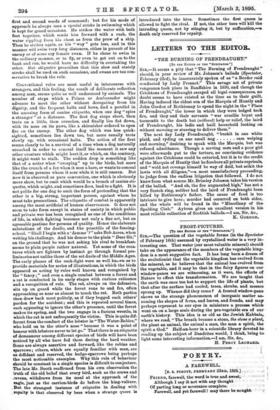LETTERS TO THE EDITOR.
"THE BURNING OF FRENDRAUGHT."
[TO THE EDITOR OF THE " SPECTATOR:]
Sin,—It seems a pity that "The Burning of Frendraught" should, in your review of Mr. Johnson's ballads (Spectator, February 23rd), be inaccurately spoken of as "a Border raid conducted by Lady Frennet." This savage act of private vengeance took place in Banffshire in 1630, and though the Crichtons of Frendraught escaped all legal consequences, no doubt seems to have existed at the time as to their guilt.. Having induced the eldest son of the Marquis of Huntly and John Gordon of Rothiemay to spend the night in the "Place of Frendraught," the tower in which they were lodged took fire, and they and their servants "war cruellie brynt and tormentit to the death but (without) help or relief, the laird of Frendraught, his ladie and hail household looking on without moveing or starring to deliver them."
The next day Lady Frendraught, " baskit in ane white plaid, and ryding on ane small nag cam weiping and morning," desiring to speak with the Marquis, but was' refused admittance. Though a serving mall and a poor girl were afterwards put to the torture, no convincing evidence- against the Crichtons could be extorted, but it is to the credit of the Marquis of Huntly that he forebore all private reprisals, and " wold not revenge himself be way of deid, but seikit the lawis with all diligens,"—a most unsatisfactory proceeding,. to judge from the endless litigation that followed. I do not know from what source Mr. Brimley Johnson takes his version of the ballad. "And oh, the fire augmented high," has not a very Scotch ring, neither had the laird of Frendraught been killed by Rothiemay's father. The cause of feud is too intricate to give here ; murder had occurred on both sides„ and the whole will be found in the "Miscellany of the Spalding Club." Aytoun gives an excellent version in his. most reliable collection of Scottish ballads.—I am, Sir, &c., K. GORDON.


































 Previous page
Previous page